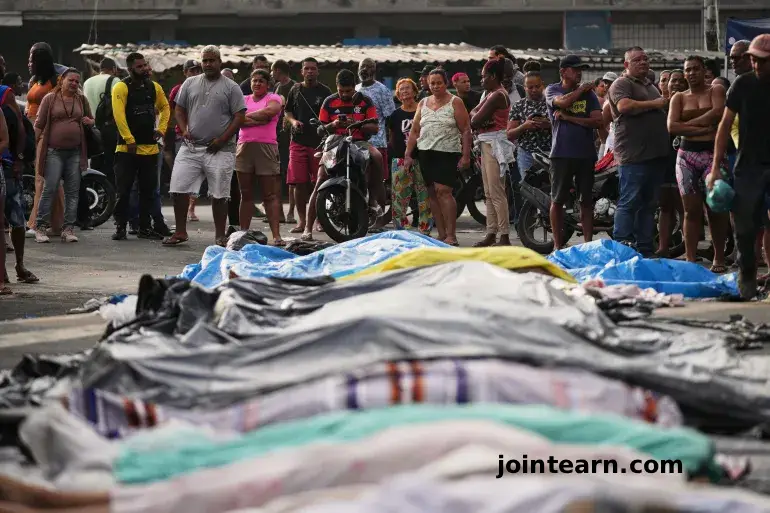
Rio de Janeiro, Brazil – November 1, 2025
Hundreds of demonstrators marched through Vila Cruzeiro, one of the favelas targeted in Rio de Janeiro’s deadliest police operation in history, demanding the resignation of Rio state Governor Claudio Castro. The protests follow a police raid this week that left at least 121 people dead, including four officers, and exposed deep tensions between law enforcement and residents in Rio’s low-income neighborhoods.
Background: The Police Raid
On Tuesday, some 2,500 police officers and soldiers conducted a large-scale operation targeting the notorious Comando Vermelho (Red Command) gang in the Complexo de Alemao and Complexo da Penha favelas. Armed with helicopters and armored vehicles, authorities aimed to capture gang leaders and curb the group’s territorial expansion, which has grown over recent years.
Residents described chaos during the raid, including retaliation from gang members. Authorities initially reported 64 fatalities, but further investigation by locals revealed dozens more bodies in wooded areas, bringing the death toll to at least 121.
Protests and Public Outcry
The funerals and protests in Vila Cruzeiro became focal points for community anger, as relatives, politicians, activists, and grieving mothers demanded justice. Demonstrators labeled Governor Castro an “assassin” and called the operation a massacre. Chants included, “Out with Castro, stop the massacres!” and placards read, “120 lives lost is not a success” and “Castro has blood on his hands.”
Councilwoman Monica Benicio condemned the operation, saying, “Assassinating young people in favelas isn’t public policy. It’s a massacre.” Many protesters also highlighted the horrific state of the bodies, with reports of decapitations, puncture wounds, and victims tied up, raising questions about excessive force.
Government Response and Legal Oversight
Governor Castro defended the operation as a success against “narco-terrorists,” noting that many of the victims had criminal records or outstanding arrest warrants. The state government said 42 of the 99 identified suspects were wanted, and 78 had extensive criminal histories.
However, the unprecedented death toll prompted national and international condemnation. Human Rights Watch called the operation “disastrous” and demanded a prompt, thorough, and independent investigation of each killing. The United Nations also criticized the scale of the operation.
Brazil’s Supreme Court and lawmakers have requested detailed information from Governor Castro on the raid. Supreme Court Justice Alexandre de Moraes scheduled a hearing with Castro and the heads of the military and civil police for November 3.
President Luiz Inacio Lula da Silva responded on X, proposing a bill to parliament mandating a minimum 30-year prison sentence for gang members, while emphasizing that federal support is crucial for Rio’s fight against organized crime. Castro, in turn, accused the federal government of being soft on crime and abandoning Rio in its anti-gang efforts.
Implications
The incident highlights the ongoing challenges of policing in Rio de Janeiro’s favelas, where violence, poverty, and gang influence collide. Experts warn that heavy-handed police operations risk escalating tensions and increasing civilian casualties, underscoring the urgent need for reform and accountability.


Leave a Reply